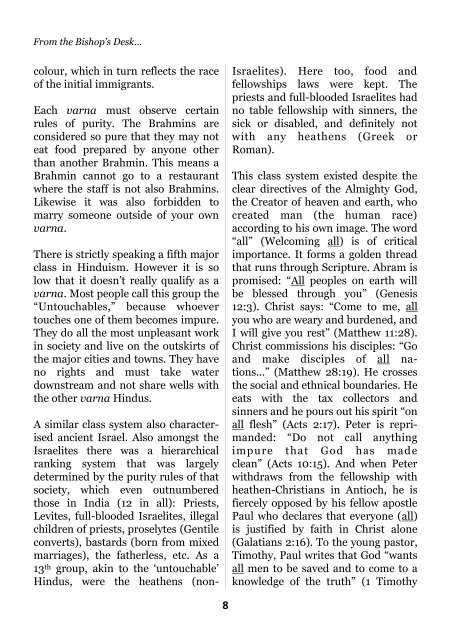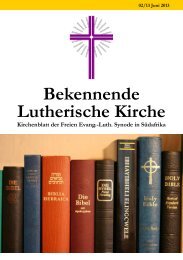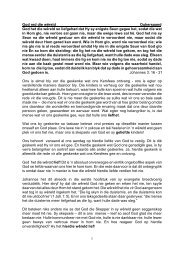FELSISA Witness VELSISA Boodskapper
FELSISA Witness VELSISA Boodskapper
FELSISA Witness VELSISA Boodskapper
You also want an ePaper? Increase the reach of your titles
YUMPU automatically turns print PDFs into web optimized ePapers that Google loves.
From the Bishop’s Desk...<br />
colour, which in turn reflects the race<br />
of the initial immigrants.<br />
Each varna must observe certain<br />
rules of purity. The Brahmins are<br />
considered so pure that they may not<br />
eat food prepared by anyone other<br />
than another Brahmin. This means a<br />
Brahmin cannot go to a restaurant<br />
where the staff is not also Brahmins.<br />
Likewise it was also forbidden to<br />
marry someone outside of your own<br />
varna.<br />
There is strictly speaking a fifth major<br />
class in Hinduism. However it is so<br />
low that it doesn’t really qualify as a<br />
varna. Most people call this group the<br />
“Untouchables,” because whoever<br />
touches one of them becomes impure.<br />
They do all the most unpleasant work<br />
in society and live on the outskirts of<br />
the major cities and towns. They have<br />
no rights and must take water<br />
downstream and not share wells with<br />
the other varna Hindus.<br />
A similar class system also characterised<br />
ancient Israel. Also amongst the<br />
Israelites there was a hierarchical<br />
ranking system that was largely<br />
determined by the purity rules of that<br />
society, which even outnumbered<br />
those in India (12 in all): Priests,<br />
Levites, full-blooded Israelites, illegal<br />
children of priests, proselytes (Gentile<br />
converts), bastards (born from mixed<br />
marriages), the fatherless, etc. As a<br />
13 th group, akin to the ‘untouchable’<br />
Hindus, were the heathens (non-<br />
8<br />
Israelites). Here too, food and<br />
fellowships laws were kept. The<br />
priests and full-blooded Israelites had<br />
no table fellowship with sinners, the<br />
sick or disabled, and definitely not<br />
with any heathens (Greek or<br />
Roman).<br />
This class system existed despite the<br />
clear directives of the Almighty God,<br />
the Creator of heaven and earth, who<br />
created man (the human race)<br />
according to his own image. The word<br />
“all” (Welcoming all) is of critical<br />
importance. It forms a golden thread<br />
that runs through Scripture. Abram is<br />
promised: “All peoples on earth will<br />
be blessed through you” (Genesis<br />
12:3). Christ says: “Come to me, all<br />
you who are weary and burdened, and<br />
I will give you rest” (Matthew 11:28).<br />
Christ commissions his disciples: “Go<br />
and make disciples of all nations...”<br />
(Matthew 28:19). He crosses<br />
the social and ethnical boundaries. He<br />
eats with the tax collectors and<br />
sinners and he pours out his spirit “on<br />
all flesh” (Acts 2:17). Peter is reprimanded:<br />
“Do not call anything<br />
impure that God has made<br />
clean” (Acts 10:15). And when Peter<br />
withdraws from the fellowship with<br />
heathen-Christians in Antioch, he is<br />
fiercely opposed by his fellow apostle<br />
Paul who declares that everyone (all)<br />
is justified by faith in Christ alone<br />
(Galatians 2:16). To the young pastor,<br />
Timothy, Paul writes that God “wants<br />
all men to be saved and to come to a<br />
knowledge of the truth” (1 Timothy











